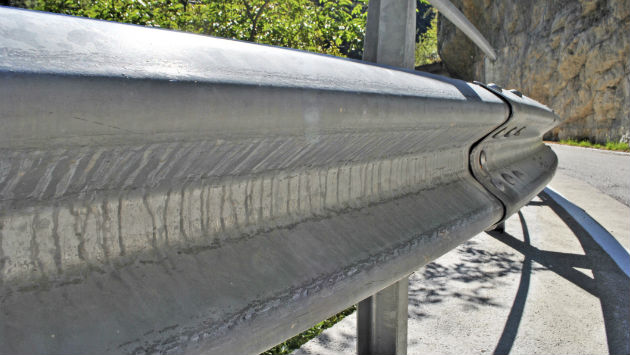 iStock/Thinkstock(NEW YORK) — A Canadian province has joined more than half of U.S. states in suspending the installation of a controversial guardrail system linked to severed limbs and deaths in auto accidents, as reported in a recent ABC News investigation.
iStock/Thinkstock(NEW YORK) — A Canadian province has joined more than half of U.S. states in suspending the installation of a controversial guardrail system linked to severed limbs and deaths in auto accidents, as reported in a recent ABC News investigation.
Transportation officials in the province of Quebec announced the suspension on Thursday, as well as an investigation into the approximately 4,500 ET-Plus guardrails currently installed in the province.
In America more than 30 states have already suspended the installation of the ET-Plus system, made by Texas-based Trinity Industries. Last month Trinity was found by a Texas jury to have defrauded the government after it changed the design of the guardrail’s end terminal back in 2005 and failed to tell federal or state transportation officials until questions were raised in 2012.
The ET-Plus System was the subject of an ABC News 20/20 investigation in September that looked into allegations from crash victims that the modified guardrail can malfunction when struck from the front by their vehicles. Rather than ribboning out and absorbing the impact as designed, the guardrails “locked up” and speared straight through the cars, severing the motorists’ limbs in some cases.
One modification made in 2005, slimming a piece of metal in the end terminal from five inches to four, was estimated to save the company $2 per guardrail end terminal, or $50,000 per year, according to an internal Trinity email obtained by ABC News.
After the Texas verdict, the U.S. Federal Highway Administration ordered Trinity to conduct new crash tests on the guardrail end terminals – 200,000 of which are estimated to be on American highways – to prove they are safe. Trinity has maintained the guardrails function properly and noted that the FHWA approved them for use even after allegations of misconduct surfaced in 2012.
The FHWA announced Wednesday it had accepted Trinity’s plan to re-test the devices at a facility in San Antonio. While Trinity said it was “pleased” that the FHWA accepted their plan, critics, including Sen. Richard Blumenthal, were concerned the FHWA had accepted a plan that could allow Trinity to “game the system.”
“I am very concerned that the testing protocol you’ve prescribed is woefully inadequate and far too deferential to Trinity,” Blumenthal, D-Conn., said in a letter to FHWA Acting Administrator Gregory Nadeau.
In announcing the testing plan, Nadeau said the new crash tests were “only one action among several efforts we’re undertaking on behalf of the American driving public.”
“Our work to protect American motorists doesn’t end with the re-testing of the ET-Plus,” he said.
Representatives for other Canadian provinces were not immediately available to comment on Quebec’s announcement. Trinity did not immediately respond to a request for comment for this report.
Follow @ABCNewsRadio
Copyright 2014 ABC News Radio











